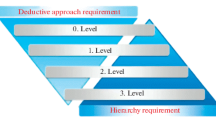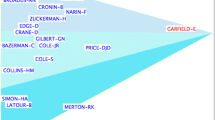Abstract
We present an application of the h-index in a context which does not include publications or citations. Rankings of library classification categories using the h-, g-and R-index are shown to be statistically equivalent. Moreover these indices seem to have the same discriminating power, as measured by the Gini concentration index. We further present best fitting Zipf-Mandelbrot functions for the h-distributions of classifications in different libraries.
Similar content being viewed by others
References
Ball, P. (2005), Index aims for fair ranking of scientists. Nature, 436: 900.
Banks, M. G. (2006), An extension of the Hirsch index: indexing scientific topics and compounds. Scientometrics, 69: 161–168.
Bar-Ilan, J. (2006), H-index for Price medalists revisited. ISSI Newsletter, 2(1): 3–5.
Bornmann, L., Daniel, H.-D. (2005), Does the h-index for ranking of scientists really work? Scientometrics, 65: 391–392.
Braun T., Glänzel, W., Schubert, A. (2005), A Hirsch-type index for journals. The Scientist, 19(22): 8.
Burrell, Q. L. (2007a), Hirsch index or Hirsch rate? Some thoughts arising from Liang’s data. Scientometrics, 73: 19–28.
Burrell, Q. L. (2007b), On the h-index, the size of the Hirsch core and Jin’s A-index. Journal of Informetrics, 1: 170–177.
Cronin, B., Meho, L. I. (2006), Using the h-index to rank influential information scientists. Journal of the American Society for Information Science and Technology, 57: 1275–1278.
Egghe, L. (2005). Power laws in the information production process: Lotkaian informetrics. Oxford (UK): Elsevier.
Egghe, L. (2006a), An improvement of the H-index: the G-index. ISSI Newsletter, 2(1): 8–9.
Egghe, L. (2006b), Theory and practice of the g-index. Scientometrics, 69: 131–152.
Egghe, L. (2007), Distributions of the h-index and the g-index. In: D. Torres-Salinas, H. F. Moed (Eds), Proceedings of ISSI 2007, Madrid, CSIC, pp. 245–253.
Egghe, L., Rousseau, R. (2006a), An informetric model for the Hirsch index. Scientometrics, 69: 121–129.
Egghe, L., Rousseau, R. (2006b), Systems without low-productive sources. Information Processing and Management, 42: 1428–1441.
Glänzel, W. (2006a), On the opportunities and limitations of the H-index. Science Focus, 1(1): 10–11 (in Chinese). English version available at E-LIS, code: 9535.
Glänzel, W. (2006b), On the h-index — a mathematical approach to a new measure of publication activity and citation impact. Scientometrics, 67: 315–321.
Glänzel, W., Persson, O. (2005), H-index for Price medalists. ISSI Newsletter, 1(4): 5–18.
Hirsch, J. E. (2005), An index to quantify an individual’s scientific research output. Proceedings of the National Academy of Sciences of the USA, 102(46): 16569–16572.
Jin, B. (2006), H-index: an evaluation indicator proposed by scientist. Science Focus, 1(1): 8–9 (In Chinese).
Jin, B, Liang, L., Rousseau, R., Egghe, L. (2007), The R-and AR-indices: complementing the h-index. Chinese Science Bulletin, 52: 855–863.
Kosmulski, M. (2006), A new Hirsch-type index saves time and works equally well as the original h-index. ISSI Newsletter, 2(3): 4–6.
Liang, L. (2006), H-index sequence and h-index matrix: constructions and applications. Scientometrics, 69: 153–159.
Liu, Yx., Rao, I. K. R., Rousseau, R. (2009), Empirical series for journal h-indices. Scientometrics, (to appear).
Liu, Yx., Rousseau, R. (2007), Hirsch-type indices and library management: the case of Tongji University Library. In: D. Torres-Salinas, H. F. Moed (Eds), Proceedings of ISSI 2007. Madrid: CINDOC-CSIC, pp. 514–522.
Prathap, G. (2006), Hirsch-type indices for ranking institutions’ scientific research output, Current Science, 91(11): 10
Rao, I. K. R. (2007), Distributions of Hirsch-index and g-index: an empirical study, In: D. Torres-Salinas, H. F. Moed (Eds), Proceedings of ISSI 2007, Madrid, CSIC, pp. 655–658.
Rousseau, R. (2006a), A case study: evolution of JASIS’ h-index. Science Focus, 1(1) (in Chinese). English version available at E-LIS, code 5430.
Rousseau, R. (2006b), New developments related to the Hirsch index. Science Focus, 1(4): 23–25 (in Chinese). English version available at E-LIS, code 6376.
Rousseau, R. (2007), The influence of missing publications on the Hirsch index. Journal of Informetrics, 1: 2–7.
Schreiber, M. (2007), Self-citation corrections for the h-index. EPL, 78 30002 (6pp) doi:10.1209/0295-5075/78/30002.
Schubert, A. (2007), Successive h-indices. Scientometrics, 70: 201–205.
Sidiropoulos, A., Katsaros, D., Manopoulos, Y. (2007), Generalized h-index for disclosing latent facts in citation networks. Scientometrics, 72: 253–280.
The STIMULATE-6 GROUP (2007), The Hirsch index applied to topics of interest to developing countries. First Monday, 12(2). http://www.firstmonday.org/issues/issue12_2/stimulate/
Vanclay, J. K. (2007), On the robustness of the h-index. Journal of the American Society for Information Science and Technology, 58: 1547–1550.
Van Raan, A. F. J. (2006), Comparison of the Hirsch-index with standard bibliometric indicators and with peer judgment for 147 chemistry research groups. Scientometrics, 67: 491–502.
Author information
Authors and Affiliations
Corresponding author
Rights and permissions
About this article
Cite this article
Liu, Y., Rousseau, R. Properties of Hirsch-type indices: the case of library classification categories. Scientometrics 79, 235–248 (2009). https://doi.org/10.1007/s11192-009-0415-1
Received:
Published:
Issue Date:
DOI: https://doi.org/10.1007/s11192-009-0415-1




